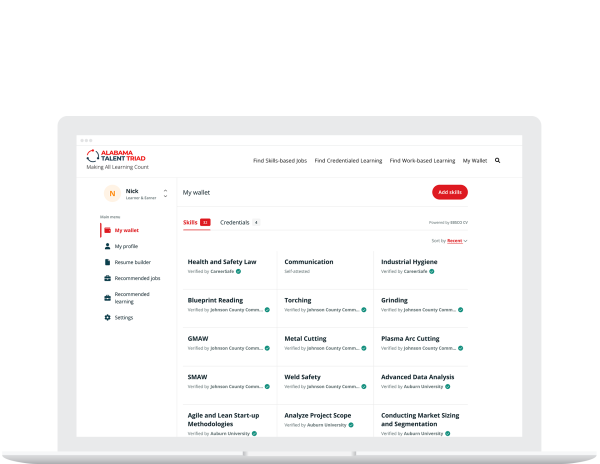You have /5 articles left.
Sign up for a free account or log in.

Digital credential wallets allow students to keep their credentials, degrees and skills all in one place.
Getty Images
In 2004, a then 22-year-old Timothy Summers received a small, laminated copy of his college diploma.
“There’s this idea of having your journey, and it’s yours—you own it, have it in your pocket and can take it out and tell your story,” he said.
Two decades later, Summers wanted to instill that same sense of ownership in students at Arizona State University. So he spent years—and raised millions of dollars—to build ASU Pocket, a digital credentials wallet that holds a student’s transcript, certificates and other badges.
“It’s having an app in your phone that represents not only the quiz you took in class but the knowledge of horticulture you learned in a local community garden,” said Summers, the former executive director of ASU’s enterprise technology. “We’re seeing lifelong learners realize and embrace a bit more of their ability to be creators and that’s what learning and education is all about.”
ASU is part of a growing number of institutions—both in higher education and the corporate world—turning toward a catch-all digital wallet. While the idea has percolated for more than a decade, entities including ASU and the Massachusetts Institute for Technology are now building open-source technology for others to easily leverage. That, coupled with more technology adoption and a greater emphasis on skills instead of degrees, is creating momentum.
“I do think we’re at a place we’re really poised to go big,” said Sharon Leu, executive in residence at JFFLabs, which is Jobs for the Future’s innovation lab. The nonprofit focuses on bridging learners and employers with digital infrastructure including learning and employment records.
A Push Toward Adoption
Digital credential wallets are a tool, usually an app, to keep learning and employment records in one place. They’re part of a larger digital trend that goes beyond higher education. The Departments of Motor Vehicles in multiple states offer digital licenses; the Department of Homeland Security is looking to do the same with digital visas and thousands of convenience stores now ask for digital age verification instead of a driver’s license from those buying alcohol.
Academia initially saw digital wallets as a way of easing the transition for transfer students. That application remains, but a new focus is giving students a feeling of ownership over their records and achievements.
“It becomes a part of what the learner controls instead of having the credentials sit on a platform that may or may not go out of business, or be issued to an email you may not have access to,” said Kerri Lemoie, executive director of the Digital Credentials Consortium. “As long as it’s in your wallet, you have control over it and who sees it.”
Keisha Campbell, executive director for enrollment services at Morgan State University, pointed toward digital wallets’ ability to better connect and market students to potential employers. She gave the example of a student with a 2.3 GPA that may have more applicable skills for a job than a student with a 4.0 GPA.
“It’s a storytelling opportunity; one thing you can do with this is fill in some of the gaps and spaces that a transcript may not,” Campbell said. “It’s important to recognize you’re learning all along the way and whether you leave with a diploma or a credential, it’s still helpful.”
State government systems have also taken note of the potential benefits of digital wallets. Both Indiana and Alabama are launching digital wallets for learners.

Alabama’s state government is among a growing group that is adopting digital wallets in an effort to help the workforce secure jobs.
Alabama Talent Triad
Mass adoption could be further spurred by ASU’s Pocket and the Digital Credentials Consortium, headed up by the Massachusetts Institute of Technology. Both are working on creating open-source digital wallets, meaning institutions could take the technology and add it to their existing systems, instead of spending time and money to build their own.
“One of the primary tenets of tech adoption is making it easy,” Lemoie said. “I think we’re on the precipice of something happening, and in the next few years it’ll go more mainstream, but a lot of times there’s the on-the-ground work of getting it activated.”
Digital Wallet Challenges
Adoption of digital wallets in higher ed has been slow in the past for several reasons, including confusing name changes—Inside Higher Ed referred to the concept as a ‘comprehensive learner record’ just two years ago. There is also the oft-repeated joke that higher education institutions are not quick to adapt to new trends.
“It’s been the same since the late 1800s with transcripts,” Campbell said. “For most people, it is a pretty serious undertaking. And you have to do the work behind it—there’s governance, there’s conversations of, ‘Are employers using it?’”
New Mexico Community College began discussing digital wallets in 2019, well before the technology “advanced dramatically,” according to Kyle Lee, chief executive officer for CNM Ingenuity. The nonprofit is an entity formed by Central New Mexico Community College. While the tech groundwork is now laid, there is more of a focus on continuing conversations versus rushing to act.
There’s also the daunting undertaking of overhauling an entire technology ecosystem.
“In one sense, this is not hard; the technology is there and it works,” Leu of JFFLabs said. “But the bigger question is, ‘What is the change management process?’ That process is not an insurmountable barrier.”
But officials believe these hurdles can, and will, be overcome, as higher education enters into a new iteration of need.
“We have to think of education as an ‘and’ statement: It’s ‘academic learning’ and ‘life learning,’” CNM Ingenuity’s Lee said. “We’re in this storm where we’re getting the most value for this individual, as opposed to what emerged as a linear path where you go into white or blue collar worlds. This is a new collar environment.”





